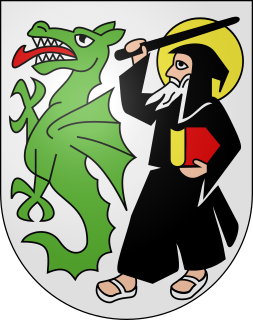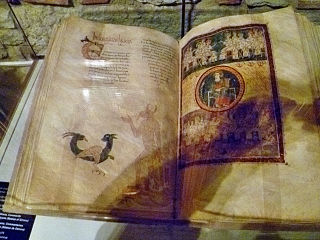
Saint Beatus of Liébana was a monk, theologian, and geographer from the former Duchy of Cantabria and Kingdom of Asturias, in modern Cantabria, northern Spain, who worked and lived in the Picos de Europa mountains of the region of Liébana. He is best remembered today as the author of the Commentary on the Apocalypse.
Beatus, meaning blessed in Medieval Latin, may mean:

Beatus Rhenanus, born as Beatus Bild, was a German humanist, religious reformer, classical scholar, and book collector.

Beatus of Lungern, known also by the honorific Apostle of Switzerland or as Beatus of Beatenberg or Beatus of Thun, was probably a legendary monk and hermit of early Christianity, and is revered as a saint. Though his legend states that he died in the 2nd century, it is likely that his story has been conflated with other saints of the same name, especially Beatus of Vendôme, and an Abbot Beatus who received a charter in 810 from Charlemagne to confirm that Honau Abbey would be administered by Irish monks.

The Mindanao shrew is a species of mammal in the family Soricidae. It is endemic to the Philippines. Its natural habitat is subtropical or tropical dry forests. It is threatened by habitat loss.

Commentary on the Apocalypse is a book written in the eighth century by the Spanish monk and theologian Beatus of Liébana (730–785) and copied and illustrated in manuscript in works called "Beati" during the 10th and 11th Centuries a.d. It is a commentary on the New Testament Apocalypse of John or Book of Revelation. It also refers to any manuscript copy of this work, especially any of the 27 illuminated copies that have survived. It is often referred to simply as the Beatus. The historical significance of the Commentary is made even more pronounced since it included a world map, which offers a rare insight into the geographical understanding of the post-Roman world. Well-known copies include the Morgan, the Saint-Sever, the Gerona, the Osma and the Madrid Beatus codices.
SS Beatus was a British cargo steamship that was built in 1925, sailed in a number of transatlantic convoys in 1940 and was sunk by a U-boat that October.

The Gerona Beatus is a 10th-century illuminated manuscript currently housed in the museum of Girona Cathedral, Catalonia, Spain.

Psalm 112 is the 112th psalm of the biblical Book of Psalms. In the Greek Septuagint version of the bible, and in its Latin translation in the Vulgate, this psalm is Psalm 111 in a slightly different numbering system.
Proprioseiopsis is a genus of mites in the family Phytoseiidae.
Proprioseiopsis bay is a species of mite in the family Phytoseiidae.
Proprioseiopsis citri is a species of mite in the family Phytoseiidae.
Proprioseiopsis dacus is a species of mite in the family Phytoseiidae.
Proprioseiopsis edbakeri is a species of mite in the family Phytoseiidae.
Proprioseiopsis exitus is a species of mite in the family Phytoseiidae.
Proprioseiopsis farallonicus is a species of mite in the family Phytoseiidae.
Proprioseiopsis ferratus is a species of mite in the family Phytoseiidae.
Proprioseiopsis latocavi is a species of mite in the family Phytoseiidae.

Beatus vir are the first words in the Latin Vulgate Bible of both Psalm 1 and Psalm 112. In each case, the words are used to refer to frequent and significant uses of these psalms in art, although the two psalms are prominent in different fields, art in the case of Psalm 1 and music in the case of Psalm 112. In psalter manuscripts, the initial letter B of Beatus is often rendered prominently as a Beatus initial.







